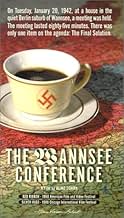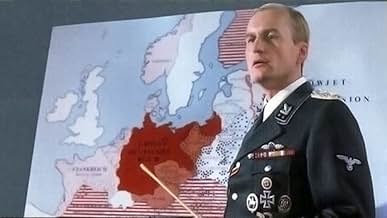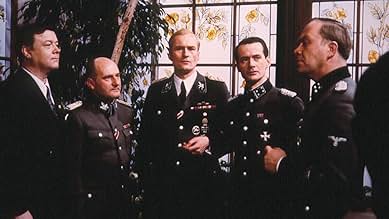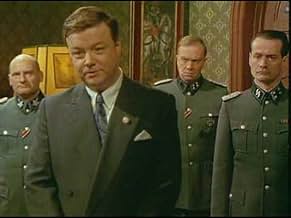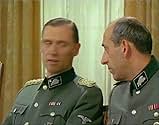NOTE IMDb
7,7/10
1,4 k
MA NOTE
Ajouter une intrigue dans votre langueAt the Wannsee Conference on January 20, 1942, senior Nazi officials meet to determine the manner in which the so-called "Final Solution to the Jewish Question" can be best implemented.At the Wannsee Conference on January 20, 1942, senior Nazi officials meet to determine the manner in which the so-called "Final Solution to the Jewish Question" can be best implemented.At the Wannsee Conference on January 20, 1942, senior Nazi officials meet to determine the manner in which the so-called "Final Solution to the Jewish Question" can be best implemented.
- Réalisation
- Scénario
- Casting principal
Friedrich G. Beckhaus
- Heinrich Müller
- (as Friedrich Beckhaus)
Hans-Werner Bussinger
- Martin Luther
- (as Hans W. Bussinger)
Werner Asam
- Heydrich's Adjutant
- (non crédité)
Avis à la une
I was able to see this film at a film festival, where the director spoke afterward about how the film was created. As I had suspected while watching the film, the source for the script was not just the minutes of the meeting, which mention very little of the detailed discussions which occurred that day, but as well what the director called the "Eichmann protocol," that is, transcripts of the interviews conducted by the prosecutors at Eichmann's trial in Jerusalem. Grupenfeurher is correct when he says that the minutes of the conference never mention extermination. But Eichmann's later, extensive, comments prove that that is precisely what was being discussed. For a detailed look at the conference, the best place to begin is Mark Roseman's book, "The Villa, the Lake, and the Meeting: Wansee and the Final Solution." But there are also comments noted in Goebels' diary, and interdepartmenal memos from those who were invited to the conference itself, and much other evidence besides. A good discussion of the process leading to the genocide can be found in Christopher Browning's "Origins of the Final Solution," and a more abbreviated discussion in volume two of Ian Kershaw's biography of Hitler, "Nemesis."
In 1942, the wealthy district of Wannsee played host to a gathering of high-ranking officials of the Nazi party. Led by SS-Obergruppenführer Reinhard Heydrich- considered by many to be Hitler's natural successor- the group are there for one purpose: to discuss the method by which they will make the Third Reich free of Jews. As they debate their options, analysing the situation as they see it, the men consider many fiendishly methodical methods of murder, showing themselves to be completely morally bereft in their quest for a final solution.
Directed by Heinz Schirk, 'The Wannsee Conference' is a gripping account of the titular meeting, offering much insight into the personalities and attitudes within the Third Reich. A made for TV movie, it is based on the minutes of the real conference, and boasts strong dialogue and perceptive characterisation from screenwriter Paul Mommertz. His characters are believable, villainously banal and systematic in their approach; making the film all the more impactful.
Heydrich and the others, regarding Jews as subhumans on the level of vermin, contemplate mass murder with the casual air of businessmen deciding on their lunch orders. Their discussions about who they consider Jewish, or half-Jewish, makes for fascinating viewing, offering viewers insight into their heinous mindset. Schirk's film shows how the bureaucratization of genocide transformed the unthinkable into the executable. The film meticulously depicts the process by which a group of seemingly civilized men could rationalize and organize the systematic slaughter of millions. The stark, cold meeting room becomes a chilling echo chamber of complicity, where the veneer of legality and procedure masks the monstrous reality of their plans.
By stripping away the dramatic excess often associated with the portrayal of Nazis in media, the film presents a more disturbing truth: that the Holocaust was a product of seemingly mundane administrative decisions made by men who believed they were simply solving a problem. This realization is perhaps the film's most haunting contribution to the historical narrative, leaving viewers to ponder the depths of human depravity and the importance of vigilance in the face of ideology run amok.
Visually, it is filmed as if it were a play, with static shots, minimal camera movement and a focus on dialogue and performance, emphasizing the claustrophobic atmosphere of the conference room and reflecting the oppressive nature of the subject matter. The production design is austere and functional, with an attention to historical accuracy that lends authenticity to the setting. The use of real-time filming, mirroring the actual duration of the Wannsee Conference, creates a sense of immediacy and tension, as viewers are made to feel as if they are there witnessing the events unfold.
Dietrich Mattausch leads the cast as Heydrich, making him seedily suave and chillingly charismatic. Calculating and persuasive, his controlled delivery and cold gaze capture the chilling resolve of a man orchestrating genocide. Gerd Böckmann is similarly impressive as the reserved Adolf Eichman, giving an understated and subtle performance; his matter-of-fact tone and clinical precision revealing the horrifying casual composure with which these men approached the extermination of millions. Peter Fitz does strong work as Wilhelm Stuckart, who has a strange and twisted sense of his own morality, conveying both the intellectual arrogance and the moral bankruptcy of his character; adding another layer of depth to the film's exploration of complicity.
Furthermore, Harald Dietl and Martin Lüttge also shine as Afred Meyer and Rudolf Lange, respectively, highlighting the power dynamics at play and the uncomfortable ease with which they discuss mass murder. Additionally, in the small but pivotal role as the secretary taking down the minutes, Anita Mally subtly embodies the overlooked cog in the Nazi bureaucratic machine. Devoid of any visible emotion or moral conflict, her dutiful transcription of the conference's proceedings encapsulates the terrifying ordinariness that can accompany evil deeds.
Informative and captivating, Heinz Schirk's 'The Wannsee Conference' is an important and effective made for TV movie, documenting a turning point in history. Featuring strong dialogue from Paul Mommertz, this retelling of the titular event explores the situation and characters involved with nuance and insight. Boasting fine cinematography from Horst Schier and authentic production design, as well as powerhouse performances from all in the cast, the film stands as a stark reminder of the banality of evil and the ease with which humanity can slip into darkness.
Directed by Heinz Schirk, 'The Wannsee Conference' is a gripping account of the titular meeting, offering much insight into the personalities and attitudes within the Third Reich. A made for TV movie, it is based on the minutes of the real conference, and boasts strong dialogue and perceptive characterisation from screenwriter Paul Mommertz. His characters are believable, villainously banal and systematic in their approach; making the film all the more impactful.
Heydrich and the others, regarding Jews as subhumans on the level of vermin, contemplate mass murder with the casual air of businessmen deciding on their lunch orders. Their discussions about who they consider Jewish, or half-Jewish, makes for fascinating viewing, offering viewers insight into their heinous mindset. Schirk's film shows how the bureaucratization of genocide transformed the unthinkable into the executable. The film meticulously depicts the process by which a group of seemingly civilized men could rationalize and organize the systematic slaughter of millions. The stark, cold meeting room becomes a chilling echo chamber of complicity, where the veneer of legality and procedure masks the monstrous reality of their plans.
By stripping away the dramatic excess often associated with the portrayal of Nazis in media, the film presents a more disturbing truth: that the Holocaust was a product of seemingly mundane administrative decisions made by men who believed they were simply solving a problem. This realization is perhaps the film's most haunting contribution to the historical narrative, leaving viewers to ponder the depths of human depravity and the importance of vigilance in the face of ideology run amok.
Visually, it is filmed as if it were a play, with static shots, minimal camera movement and a focus on dialogue and performance, emphasizing the claustrophobic atmosphere of the conference room and reflecting the oppressive nature of the subject matter. The production design is austere and functional, with an attention to historical accuracy that lends authenticity to the setting. The use of real-time filming, mirroring the actual duration of the Wannsee Conference, creates a sense of immediacy and tension, as viewers are made to feel as if they are there witnessing the events unfold.
Dietrich Mattausch leads the cast as Heydrich, making him seedily suave and chillingly charismatic. Calculating and persuasive, his controlled delivery and cold gaze capture the chilling resolve of a man orchestrating genocide. Gerd Böckmann is similarly impressive as the reserved Adolf Eichman, giving an understated and subtle performance; his matter-of-fact tone and clinical precision revealing the horrifying casual composure with which these men approached the extermination of millions. Peter Fitz does strong work as Wilhelm Stuckart, who has a strange and twisted sense of his own morality, conveying both the intellectual arrogance and the moral bankruptcy of his character; adding another layer of depth to the film's exploration of complicity.
Furthermore, Harald Dietl and Martin Lüttge also shine as Afred Meyer and Rudolf Lange, respectively, highlighting the power dynamics at play and the uncomfortable ease with which they discuss mass murder. Additionally, in the small but pivotal role as the secretary taking down the minutes, Anita Mally subtly embodies the overlooked cog in the Nazi bureaucratic machine. Devoid of any visible emotion or moral conflict, her dutiful transcription of the conference's proceedings encapsulates the terrifying ordinariness that can accompany evil deeds.
Informative and captivating, Heinz Schirk's 'The Wannsee Conference' is an important and effective made for TV movie, documenting a turning point in history. Featuring strong dialogue from Paul Mommertz, this retelling of the titular event explores the situation and characters involved with nuance and insight. Boasting fine cinematography from Horst Schier and authentic production design, as well as powerhouse performances from all in the cast, the film stands as a stark reminder of the banality of evil and the ease with which humanity can slip into darkness.
A fantastic film that needs to be released domestically on DVD. For the people who don't mind reading subtitles, this is a very, very good version of the more recent "Conspiracy". There is something more to be offered here by the fact that German actors are playing the roles. I do very much like Kenneth Branagh's performance as the manipulative Hydrich (most captivating since David Warner's double performance in "Holocaust" and "Hitler's SS, Portrait of Evil").
The film, which covers in real time the conference at Wansee where the framework of the "Final Solution" was set, is amazing. The methodical way in which it is handled, shows the real danger of evil when it it's perpetration is done on in a methodical/business like manner.
I think this film is a lesson for whomever thinks that the sins of the past can not be repeated in a modern society!
The film, which covers in real time the conference at Wansee where the framework of the "Final Solution" was set, is amazing. The methodical way in which it is handled, shows the real danger of evil when it it's perpetration is done on in a methodical/business like manner.
I think this film is a lesson for whomever thinks that the sins of the past can not be repeated in a modern society!
It was inspired programme planning on the part of BBC's Knowledge channel to preface Heinz Schirk's dramatised documentary with Alain Resnais's chilling piece of actuality footage "Nuit et Brouillard" made twenty years earlier. It is just possible that, without it, the more recent film might have lost something of its awesome impact. However, by preceding it with the most harrowing account of the consequences of that fateful meeting, there was no escaping the obscenity of what we were watching. The scene was one of glamour with smartly dressed high ranking Nazi officials being served refreshments by spotlessly groomed white uniformed young male waiters. With minutes detailing the planned murder of millions being taken by an attractive female stenographer with the calm impassivity of one recording an average business meeting, the underlying horror and grotesque irony of the occasion was complete. A masterly historical reconstruction.
Heinz Schirk masterfully--albeit painfully--captures true Nazi "spirit" as it unfolded at the Wannsee Conference in Berlin, 1942, where the "final solution" was further refined and "perfected." Not only are actors Mattausch, Bockmann, and Beckhaus dead ringers for Heydrich, Eichmann, and Muller, respectively, but Schirk brilliantly highlights the bureaucratization and cold abstraction of Nazi mass murder of the European Jewry.
Le saviez-vous
- AnecdotesAt the time of the film's production, SS-Oberführer Dr Gerhard Klopfer was the only living attendee of the Wannsee Conference. He died on January 29, 1987 at the age of 81.
- GaffesAdolf Eichmann is shown in the film wearing a Waffen-SS infantry officer's uniform complete with the SS runes unit patch. Eichmann was in fact a security police colonel and therefore should have displayed a blank security service collar patch with green police piping.
- Citations
Adolf Eichmann: There were women... children...
Reinhard Heydrich: Women and children are Jews too.
- ConnexionsRemade as La conférence (2022)
Meilleurs choix
Connectez-vous pour évaluer et suivre la liste de favoris afin de recevoir des recommandations personnalisées
Détails
- Date de sortie
- Pays d’origine
- Langues
- Aussi connu sous le nom de
- Hitler's Final Solution: The Wannsee Conference
- Lieux de tournage
- Sociétés de production
- Voir plus de crédits d'entreprise sur IMDbPro
Contribuer à cette page
Suggérer une modification ou ajouter du contenu manquant

